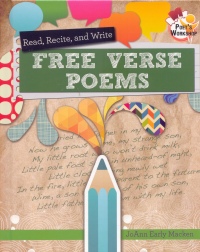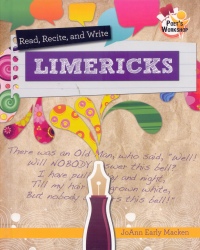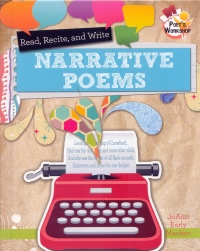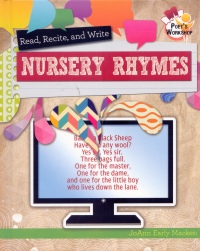| ________________
CM . . .
. Volume XXI Number 4 . . . . September 26, 2014
excerpt:
“Poet’s Workshop” is a fun and informative series that will add some new zip to those staid poetry lessons. These books can be read and enjoyed by individual students or used as examples to get the creative juices flowing with a whole class. Author JoAnn Early Macken and the entire Crabtree production team have created a winning combination of helpful activities that examine the different genres of poetry and the different parts of a poem, all presented in a very engaging format. Budding poets are taken through the steps of writing a poem, from coming up with an idea, to performing the final polished product. One chapter in each book is dedicated to revision, a step that students like to skip, but one that is important in producing the best final version possible. The information in the books follows a similar outline, helping the students to identify the characteristics of a particular type of poetry, and then taking them through the steps of creating, writing, revising and performing, but each book deals with the unique characteristics of one type of poetry. The text is clearly laid out with an engaging standard format and a very generous use of lined drawings, colourful cartoon characters, photographs of students at work, as well as photos to accompany the poems used as examples. Graphic icons identify “Literature Links”, “Poetry Pointers”, “Thinking Aloud”, and “Now It’s Your Turn!” Each book also includes a table of contents, glossary, index, and a list of other books and websites. Read, Recite and Write Free Verse Poems includes explanations and examples of personification, alliteration, assonance, voice and many other literary conventions. When discussing the form used to write free verse poems on paper, a “Poetry Pointer” explains line breaks and stanzas with a discussion of “enjambment”.
Read, Recite and Write Limericks includes chapters on writing “place name”, “animal antics”, “foolish character”, “punch line”, and “silly spelling” limericks. Examples from both anonymous authors and well-known authors, including Edward Lear, are used to illustrate the characteristics and differences between the types of limericks. “Chapter 6: Writing a Silly Spelling Limerick” even encourages students to break the rules.
Read, Recite and Write Narrative Poems focuses on poems that tell stories with plot, characters, setting, and a theme. Chapters examine biographical, mysterious, and fantasy narrative poems. The William Butler Yeats poem, “The Song of Wandering Aengus”, is used to examine rhythm and meter. Other poems, including some written by students, are used to illustrate different aspects of narrative poetry. Read, Recite and Write Nursery Rhymes includes chapters on “nonsense”, “sing-along”, “lullaby”, “game-playing” and “nature” nursery rhymes. Young poets are introduced to voice, tone, dialogue and audience, as well as different brainstorming techniques, such as clustering. Examples such as “The Farmer in the Dell”, “Hey, Diddle, Diddle”, and “Rock-a-bye Baby” will be familiar to many readers. Although the final chapter in each book is titled “Performing a Poem”, each book ends with a slightly different emphasis. “Read, Recite, and Write Narrative Poems”, for example, encourages the readers to use their voices to act out the story in the poem.
If you are looking for new ways to get students excited about poetry, ways to get them engaged enough to try writing poems, try any or all of these books in the “Poet’s Workshop” series. They are all winners. Highly Recommended. Suzanne Pierson is a retired teacher-librarian, currently instructing Librarianship courses at Queen’s University in Kingston, ON.
To comment on this title or this review, send mail to cm@umanitoba.ca.
Copyright © the Manitoba Library Association. Reproduction for personal use is permitted only if this copyright notice is maintained. Any
other reproduction is prohibited without permission.
CM Home | Next Review | Table of Contents for This Issue - September 26, 2014 | Back Issues | Search | CM Archive | Profiles Archive |



